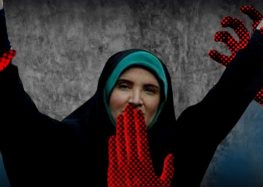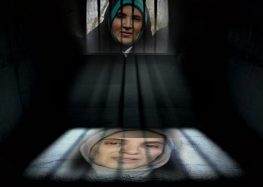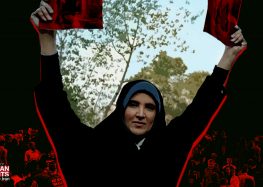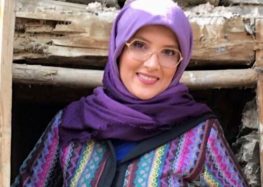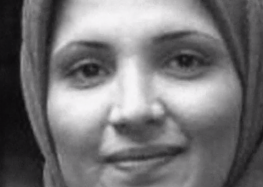Predicting Her Arrest, Reformist Activist Wrote Letters Criticizing Rouhani’s Failure to Protect Citizens

Reformist journalist Hengameh Shahidi.
Hengameh Shahidi, a reformist senior member of the Etemad Melli (National Trust) opposition party, has decried her arrest as part of a crackdown by hardliners on reformists ahead of Iran’s upcoming presidential election. In two open letters, she also criticized President Hassan Rouhani, who will be running for re-election on May 19, 2017, for failing to protect citizen’s rights.
Anticipating her arrest, which occurred on March 9, 2017, the former journalist had pre-composed two letters and arranged to have them published after she was detained.
In the first letter, published on her Instagram page on March 11, Shahidi said she was being targeted “as part of a project to arrest political activists and journalists before the presidential election so that the designated candidate (of hardliner’s) could be guaranteed a victory, just like in the 2009 election.”
“You were supposed to be a breath of fresh air for reformists after the oppressive years under (President Mahmoud) Ahmadinejad, and not choke the air out of them to become president like he did,” she wrote in the second letter published on March 15.
Rouhani’s election in 2013 would not have been possible without the support of reformist leaders.
The Center for Human Rights in Iran (CHRI) has learned that Shahidi, who lives in Tehran, was arrested by security agents in the city of Mashhad on her way to her grandmother’s funeral on March 9. In Evin Prison in Tehran she was taken to Ward 209, which is controlled by the Intelligence Ministry.
She informed her family during a short phone conversation on March 11 that she had been detained, but the charges against her, if any, remain unknown.
Shahidi was a reporter for the reformist Norooz newspaper and an adviser to Mehdi Karroubi, the Etemad Melli party’s candidate in the disputed 2009 presidential election.
Karroubi, former presidential candidate Mir Hosseini Mousavi, and Zahra Rahnavard have been under extrajudicial house arrest since 2011 for challenging the validity of the 2009 election and leading mass street demonstrations that came to be known as the Green Movement.
In the March 15 letter, Shahidi called on Rouhani, as the head of the executive branch, to “stand against the pointless, fabricated cases brought against journalists and political, civil and social activists in the country.”
While poking fun at his law degree, she also pointed out Rouhani’s hypocritical stance of constantly touting his Citizen’s Rights Charter while extrajudicial arrests happen regularly under his watch.
“Please tell us where in the charter does it say a suspect can be arrested without a written order?” she wrote. “Where does it say a suspect’s family members can be threatened and harassed?”
In the March 11 letter, Shahidi described the charter, which Rouhani signed in December 2016, as “only a deceptive slogan for international consumption” because in reality “all political suspects are sent to unlawful detention centers on security charges and humiliated in the worst way.”
She also discussed her recent expulsion from a staff position at a university south of Tehran: “Where in the charter does it say a university academic can be denied the right to teach and threatened with an acid attack and issued an arrest order by the parliamentary Committee of National Security Affairs and other agencies in order to silence her?”
Shahidi was fired from her position as an international law instructor at the Varamin-Pishva Islamic Open University after teaching only two classes on the first day of the fall term on October 10, 2016.
The day before Shahidi was sacked, a local hardline news site posted an article saying it was “regrettable” that someone who was convicted in connection with the 2009 “sedition” had been chosen “as a professor for shaping the future builders of Islamic Iran.”
Iranian officials have consistently referred to the peaceful protests that followed the disputed 2009 election as the “sedition.”
On June 30, 2009, soon after Karroubi, Mousavi and Rahnavard disputed the legitimacy of Ahmadinejad’s re-election, Shahidi was arrested and sentenced to six years in prison by Judge Yahya Pirabbasi of Branch 26 of the Revolutionary Court for “propagating against the regime,” “acting against national security” and “insulting the president.”
In June 2012 she was granted conditional release on medical grounds.
In recent months, several journalists have been arrested for unknown reasons by the Intelligence Ministry or the Islamic Revolutionary Guard Corps’ (IRGC) Intelligence Organization.
Tahereh Riahi, the social affairs editor of the state-funded Borna News Agency, has been held in Evin Prison since December 27, 2016 without access to legal counsel.
Zeinab Karimian, a producer for the state-run “Salam Khorshid” (Hello Sun) television show and former reporter for the official Islamic Republic News Agency, was arrested by security agents on January 23, 2017. Very little information is known about her condition or case.
Reformist journalist Ehsan Mazandarani was shocked with a Taser stun gun by the IRGC’s Intelligence Organization on March 11 and taken to Evin Prison, less than a month after he completed his prison sentence for “assembly and collusion against national security” and “propaganda against the state.”
Reformist political commentator Issa Saharkhiz and centrist commentator Afarin Chitsaz, a columnist for the Iran newspaper, the official publication of the Rouhani administration, have been imprisoned since November 2, 2015 after being arrested in the largest wave of arrests by the IRGC since 2009.

